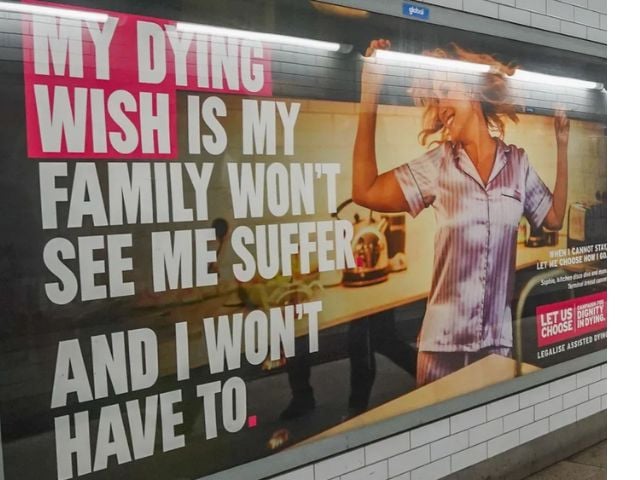
Mass advertising campaigns surrounding the controversial assisted dying bill, including prominent billboards at Westminster station and targeted Facebook ads, have drawn criticism from MPs ahead of a pivotal vote on the legislation. The debate has sparked concerns about the tactics used by both proponents and opponents of the bill, intensifying tensions on an already divisive issue.
Pro-assisted dying group Dignity in Dying has faced backlash for its billboard campaign, which features terminally ill patients advocating for the right to end their lives on their own terms. One notable ad, placed at Westminster tube station, portrays Sophie Blake, a breast cancer patient, smiling in pink pajamas, with a message about avoiding suffering. While the campaign aims to promote positive imagery, MPs have questioned its appropriateness in public spaces. Labour MP Patrick Hurley called the campaign “unwise,” citing potential risks of normalizing suicide.
On the other side, the anti-assisted dying group Care Not Killing has launched Facebook ads targeting over 50 MPs, urging constituents to pressure their representatives to vote against the bill. Critics have labeled these tactics “deeply misleading,” particularly due to the unauthorized use of the NHS logo. The group defended its approach, emphasizing the importance of public engagement on such a sensitive issue.
Amid the advertising controversy, MPs have expressed concerns over the rushed legislative process. With only five hours allotted for Friday’s debate, as many as 150 MPs are expected to speak, raising fears that the bill lacks sufficient scrutiny. A cross-party amendment seeks to delay the vote and initiate an independent review of current laws and end-of-life care practices.
Polling by JL Partners indicates 65% of the public supports legalizing assisted dying, yet 64% prioritize improving palliative care over new legislation. Critics, including London Mayor Sadiq Khan, have raised concerns about potential coercion, particularly for vulnerable individuals. Proponents argue the law would provide dignity and choice for terminally ill patients.
As the vote nears, the debate highlights the ethical complexities and societal divisions surrounding assisted dying, leaving MPs grappling with one of the most sensitive decisions in recent years.

1725366721-0/kyle-(1)1725366721-0-165x106.webp)
1731410017-0/BeFunky-collage-(45)1731410017-0-165x106.webp)

1732520496-0/BeFunky-collage-(86)1732520496-0-165x106.webp)
1732707402-0/Untitled-design-(8)1732707402-0-270x192.webp)











COMMENTS
Comments are moderated and generally will be posted if they are on-topic and not abusive.
For more information, please see our Comments FAQ